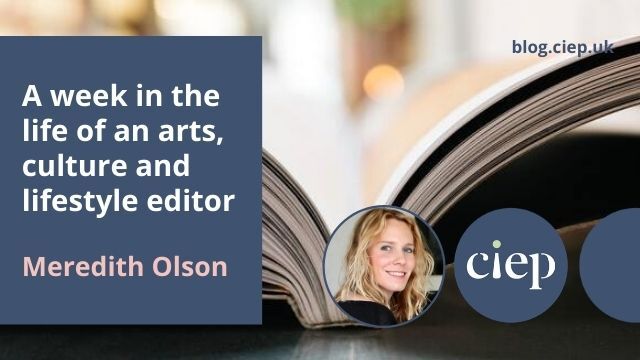Meredith Olson is an arts, culture and lifestyle editor who works in both American English and British English. In this article, she shares how she started her editing career and how a typical week can pan out.
 When people asked me what I wanted to do when I grew up, I did not know that the dream of ‘getting paid to read’ was even an option. The other thing I had hoped for, ‘getting paid to sleep’, has still not materialised, but we forge onward.
When people asked me what I wanted to do when I grew up, I did not know that the dream of ‘getting paid to read’ was even an option. The other thing I had hoped for, ‘getting paid to sleep’, has still not materialised, but we forge onward.
As a dual US/UK citizen, I work in both American English and British English – doing everything from copyediting and proofreading to copywriting and research – for publishers, websites, individuals and arts/heritage organisations.
The topics I encounter range from notorious serial killers to the world’s rarest plants, stopping to consider arts and crafts based on the music and life of Prince or behind-the-scenes military history along the way. I learn a lot, I get to read all day (albeit carefully and slowly) and with each successive project, I become a far more formidable pub-quiz contestant.
Proof of life
‘Everyone needs good copy.’ It was something I used to say to people at parties or networking events, when they asked about the ins and outs of copyediting, copywriting and proofreading. Banks, start-ups, arts institutions, brands, countless personal websites – someone had to create (and edit) that copy. Why shouldn’t it be error-free and well written, with an eye to marketing, search engine optimisation and the brand’s established tone of voice? I know I’m not the only one who, as a potential customer, went off a company once I’d seen their blatant website typos or redundant, unclever messaging. ‘Hire an editor,’ I used to say, emphatically (and will again, when I return to parties and networking).
In a now-overused line, then the pandemic hit. Suddenly, not everyone needed copy, especially not arts-, culture- and lifestyle-focused entities or publications. Gone were the discretionary budgets for improving the blog, checking the concert programmes or revamping the events guide. Many clients were not only not hiring freelancers, but they were also furloughing, laying off or offering voluntary redundancy to their permanent staff, often in shocking numbers.
Though this feels acutely personal to discuss, I know many people have experienced moments, especially during this pandemic, wherein their livelihood seemed out of their control. I suspect for many of us in the CIEP, the fact that our job is often inextricable from our passion and our skilled trade makes this even tougher.
For the first six weeks of the UK’s March 2020 lockdown, my previously scheduled projects went ahead. After that, the work almost entirely evaporated, along with my understanding of my professional purpose – I always knew I wasn’t curing cancer with my red pen and tracked changes, but I had always felt I was doing my bit to shear an author’s argument of clutter and improve people’s reading experiences. I believed I was bringing readers closer to the joy of the arts or history – or even recipes for homemade cleaning products.
In light of all the terrible things this pandemic had already wrought, it felt trite to worry about losing work. But after a month and a half of no real projects to speak of, panic had started to set in when I heard from one of my editors in non-fiction books. The publisher was seeing more demand but now had fewer staff members, so the editor suddenly had twice the amount of books in her care, meaning a steady schedule of manuscripts that needed a copyeditor or proofreader. I gratefully accepted this work, which kept me sane and financially afloat in some of the hardest moments of the pandemic. I’ve missed the challenge of bouncing from a newsletter to a website revamp to a book to a presentation deck, all with their own styles and demands, and look forward to tackling a variety of mediums once again.
 A brief brief
A brief brief
When I graduated from university into the ongoing recession in 2009, publishers in New York City were almost all on a hiring freeze. Eventually, I landed at Condé Nast, working in a small team on special-interest publications that covered a wide swath of the company’s brands and content. Rather than only engaging with one type of content, as at a traditional magazine, I was able to work with, and around, fashion, art, cuisine, living, politics and anything else they decided to turn into a collector’s edition ‘bookazine’ (0/10 for this portmanteau, though).
As the only junior member of this newly established team, I pushed the boundaries of my role, learning on the job from editors, designers and writers who were some of the industry’s best, and had worked at every major publisher in NYC. I started lingering by the copy desk with a million questions on style, which were generously fielded by the patient copy chief. I brandished proofs – these had landed on my desk in what was probably just a nice gesture by the team to include me – that I had marked up in my spare time. The thrill of finding an error and ‘saving’ the proof before it went to print matched my burgeoning interest in the contrasting minutiae of house styles.
A few years later, I returned to London, where I was born, to get a master’s degree in Issues in Modern Culture. As my family had suspected I would, I stayed in the UK after my graduation and later decided to continue my freelance career here, but with more of a focus on copyediting.
It’s been … one week
A week’s work can vary wildly, as can the parameters of ‘a week’. I’m strict about work–life balance, but like many freelancers, I sometimes choose to work evenings or part of the weekend in order to be able to accept and deliver certain projects, and then I take other time off. This week+ involved:
- copyediting three sets of AI-generated video subtitles for a branded media collaboration
- working a multi-day contract as marketing editor for an arts centre
- copyediting the first 20,000 words of a non-fiction book on the history of colours in fashion
- copyediting an academic paper, about Jewish households in Europe in the 1500s and 1600s, by an author who is not fluent in English.
A week can also include:
- Americanising a UK manuscript (and vice versa)
- writing or editing copy for a website, with attendant style and tone-of-voice research
- copyediting business or brand pitches/decks
- professional development
- everyone’s favourites: invoices (and subsequent chasing), upcoming contract paperwork, remittance-notice filing, scouting for new work.
Of course, somewhere in that week it’s likely I will wake at least once in the middle of the night, having copyedited in my sleep (for free!?) or having thought of the perfect word to supplant the slightly off one that’s been giving me trouble in a manuscript; I can also be enticed by larger style questions, endless comparisons of British English (BrE) and American English (AmE) and fact-checking wormholes (though I think I’ll cheekily class these as ‘professional development’).
As a freelancer, I get to dip into many worlds that I might not have been privy to otherwise, and it remains a privilege and delight not only to be continuously learning but also to be a guiding hand helping to get a message across clearly and concisely.
About Meredith Olson
 Meredith Olson is a freelance editor and writer covering the arts, culture and lifestyle (and beyond). She is a Professional Member of the CIEP, and a dual US/UK citizen specialis(z)ing in gearing copy towards one or both of those audiences. More information, and a selection of her work, can be found at mereditholson.com.
Meredith Olson is a freelance editor and writer covering the arts, culture and lifestyle (and beyond). She is a Professional Member of the CIEP, and a dual US/UK citizen specialis(z)ing in gearing copy towards one or both of those audiences. More information, and a selection of her work, can be found at mereditholson.com.
 About the CIEP
About the CIEP
The Chartered Institute of Editing and Proofreading (CIEP) is a non-profit body promoting excellence in English language editing. We set and demonstrate editorial standards, and we are a community, training hub and support network for editorial professionals – the people who work to make text accurate, clear and fit for purpose.
Find out more about:
Photo credits: open book by Jonas Jacobsson; origami colours by Ice Tea, both on Unsplash.
Posted by Abi Saffrey, CIEP blog coordinator.
The views expressed here do not necessarily reflect those of the CIEP.
